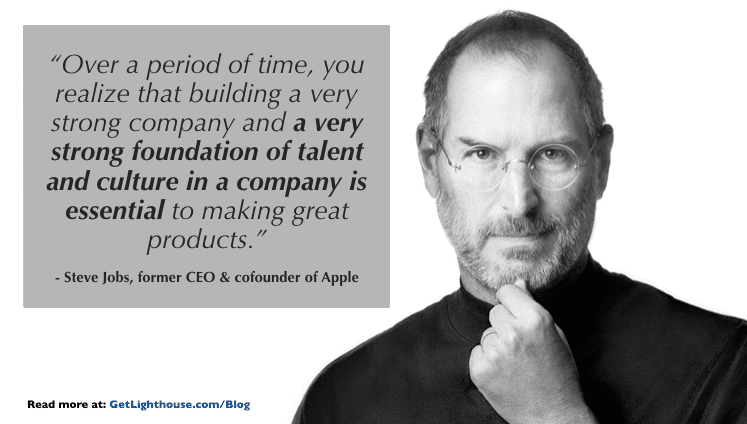How can you tell if a company's culture is on a good track or not? If you care about culture, how do you know if you should join a company, or invest in them? Today we give you 7 key questions to ask a CEO in an interview that tell you a lot about the culture, and if you're an executive leader, how you can improve your culture.
---
"Do you have good, leading indicators of culture?"
I was emailing with an investor recently discussing how so many have written about the value of culture, yet it often goes un-discussed by boards until there are Uber-level problems.
They told me the only indicator they had was to watch for turnover. Unfortunately, by the time you have turnover problems, it's often too late, or very expensive to fix.

Catch and fix problems early.
Any good leader knows you need to fix problems when they're small. They're less expensive and easier to fix then. No one's feelings get hurt. And the fix is much easier than if it's snowballed.
When it comes to culture as a company grows, this is especially important. And it is more important now than ever as maintaining and enhancing company culture is an even bigger challenge now that we are faced with hiring freezes, layoffs, and overall economic uncertainty.
Culture is like concrete.
As Joe Gebbia, co-founder of Airbnb, recalls learning from Tony Hsieh in the video above: culture is like concrete.
When it is first laid out, it is malleable and can take many shapes. However, after some time, it will harden and then it's very hard to change.
By the time you have 100s or 1,000s of employees, it's too late. You have the culture you're going to have, for better or worse. Changing it would take monumental efforts like when David Sacks was brought in at Zenefits got rid of office beer, laid off hundreds, and made dramatic changes.
Or your company may not make it at all. A toxic culture can derail your company, causing you to lose key people and damaging productivity.
An ounce of prevention...
To avoid such a fate, you have to be proactive. Get out in front of these issues and be intentional about them.
So what do you do? How can you tell if a company's culture is on a good track or not? Today we look at the questions to ask a CEO in an interview to tell if a healthy company culture is developing. Whether you're looking at investing your time (as a team member), your money (as an investor), or looking at yourself in the mirror, this post can help you think through critical aspects of a company's culture.
What Good Questions to Ask a CEO in an Interview
Whether you're an investor, advisor, or founder yourself, what should you look for to tell if there are culture problems at a company?
Also, what if you're trying to impress a CEO? You can impress your CEO by asking good questions and showing that you're prepared. By asking about the culture and how they built the company, you can make a great impression.
So, whether you're an investor, advisor, founder– or you're just trying to impress your CEO – here's a good place to start with some specific questions to ask a CEO:
- Have you had any voluntary turnover?
- How are problems solved?
- What does your company's hierarchy look like?
- Are you and your managers having 1 on 1s with your staff?
- What kind of example are you setting for your team?
- Do you promote from within?
- What are your views on work-life balance?
1. Have you had any voluntary turnover?
First and foremost, losing people is a major indicator. When people decide to leave, it's a sign that they decided the benefits and enjoyable things at work are now outweighed by what they do not like about it.
People do not change jobs hastily. Even a "job-hopper" needs to stay at a job for 12-18 months. This means that if someone is leaving, and it's not for performance issues or something like they moved away, the company, and leadership are partly responsible.
Companies that truly care measure things like this, so it's almost as telling if they don't know for sure, as if they knowingly have a problem. So it's crucial to know what to ask CEO during an interview to get a better sense of their leadership and management style.

Most importantly, in my experience, the best leaders take great pride in having 0 voluntary turnovers. Everyone has employees leave sometimes for good reasons (moving away, starting their own companies, etc), but the best retain their teams for the long haul. If the turnover at a company is high, or even worse, if a CEO tells you they don't know how many people are leaving (or deflects the question), that's a sign of a serious issue at their company.
[Ed. Note: People quit managers, not companies. Manager Score can help you catch early warning signs of problems with managers in your org & their teams, so you can fix them before you lose good people.]
Questions to ask a CEO (or yourself) about voluntary turnover:
- Have you lost any staff you didn't want to lose? What happened?
- What's your voluntary turnover for the last quarter and year?
- What do you do when an employee gives their notice?
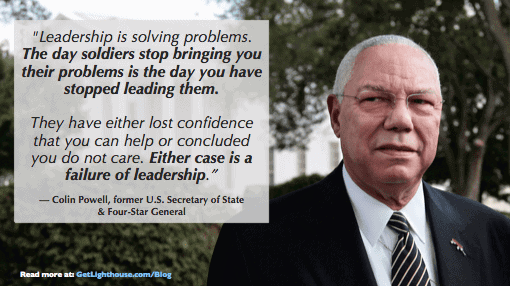
2. How are problems solved?
To better understand how a company approaches problem-solving, it's important to have a list of questions to ask a CEO during an interview. No company is perfect. Problems always arise that have to be addressed. How they are (or are not) addressed is a key part of a company's culture, and whether it's on the right track.
There are a few ways problem-solving can become its own problem:
- Concentrated decision making: If everything goes through the CEO, that's a sign of a command and control culture forming. Politics won't be far behind, and the CEO may be at risk of burnout from too much on their shoulders.
- Avoiding problems: If, like an ostrich, the tendency is to ignore problems for as long as possible, it's setting up the company to always be in fire-fighting, reactionary management mode.
- Inconsistency: A big reason for developing company values is to provide guidance on making decisions. If every problem is handled differently and sometimes in the opposite way of a past, similar problem, it leaves teams uncertain what to do next time.
These are not easy to overcome, and they can be moving targets; as a company grows, new problems arise, and the structure of the organization requires different approaches.

This is why asking about them is so important; when you're in the weeds, it's hard to see the forest for the trees. When you stop and someone asks you (or you ask yourself) the big-picture questions, it helps make better decisions that have a positive, long-term impact.
Questions to ask a CEO (or yourself) about problem-solving:
- Do all problems go through you, or is the team empowered to fix problems?
- How are problems in the company surfaced to you and other leaders?
- How are problems solved at your company? Can you give me an example?
- What's your biggest people problem you're trying to solve right now?
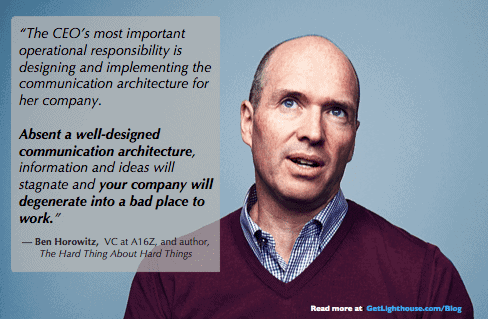
3. What does your company's hierarchy look like?
Hierarchy is not a bad thing. Done well, it makes decision making and key responsibilities clear. It also shows clear career paths for your people that want to grow and advance.
Unfortunately, too much hierarchy slows a company down. However, rarely is that the problem today. Many companies instead try to be as flat as possible, sometimes trying to have no managers at all. This was a recipe for disaster, as many found out the hard way.
Zappos, Medium, Buffer, and others tried to make various types of flat organizational structure work, in an effort to get away from corporate politics and the dangers of bad managers. They all ended as failed experiments that cost them big including stalled projects, unexpected politics, and losing key employees.
As Wistia learned:
"Every company has a structure. If you don't explicitly define your structure, then you are left with an implicit one, and that can stifle productivity. We had hoped that being flat would let us move faster and be more creative, but as we grew, we ended up with an unspoken hierarchy that actually slowed down our ability to execute."
Chris Savage, CEO and founder of Wistia
And Wistia is not alone as companies like GitHub and Buffer have had similar problems they've shared publicly.
Being intentional about the communication architecture and hierarchy of a company is a key responsibility of a leader and one of the most impactful questions to ask your CEO; you want to look for a leader intentionally building one, not stumbling into a corporate structure.
Questions to ask a CEO (or yourself) about hierarchy:
- What org structure do you have in the company today? What will it look like in 6-12 months?
- Who are leaders you see developing in your current staff?
- How do you think about the design of your organization? Do you tend to be intentional with it, or look for it to emerge organically?
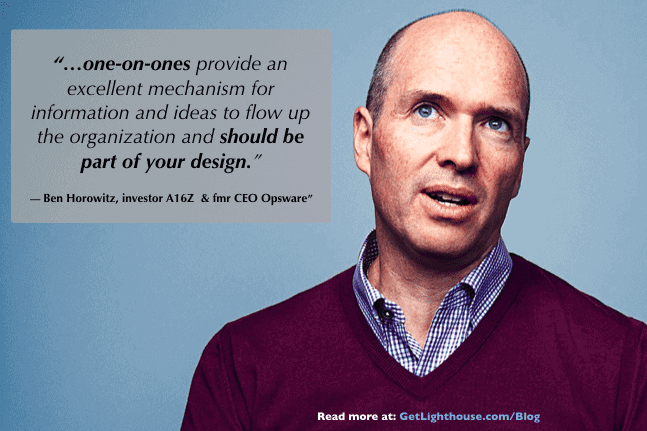
4. Are you and your managers having 1 on 1s with your staff?
1 on 1s are an essential tool to fix problems, coach people, build relationships, and talk about all the things that no one gets around to otherwise. It's why we write about 1 on 1s so often on the Lighthouse blog and built a product to help you have awesome 1 on 1 meetings.
When a company is in its early days, it's easy to think that getting beers, social outings, and a tight-knit team is enough. Unfortunately, it's not. As investor and former serial entrepreneur Jason Lemkin writes:

The place to ask these things are in private, 1 on 1 conversations. It's why so many CEOs and investors swear by 1 on 1s like Ben Horowitz, Andy Grove, Michael Wolfe, and Tomas Tunguz.
If you have more than 5 employees and don't have them, you're on your way to trouble. It's only a matter of time.
Don't have time? Can you afford to lose your best people? Remember: by the time people are frustrated and go get a job offer, it's too late.
[Ed note: Need a better way to organize your 1 on 1s, or a helpful structure to start them? Download our free 1 on 1 Meeting template below:]
Questions to ask a CEO (or yourself) about one on ones:
- Do you and your leaders have one on ones with their staff?
- What usually gets talked about in your company's one on ones? How do you know?
- How are you training new managers? What are they expected to do with their teams?

5. What kind of example are you setting for your team?
The gift and curse of being a startup founder or CEO is that your team will emulate you. If you work hard, they'll work hard. If you're kind to customers, they will be, too.
It also has its downsides. If you struggle with something, so will they. If you have a bad habit, they'll pick it up.
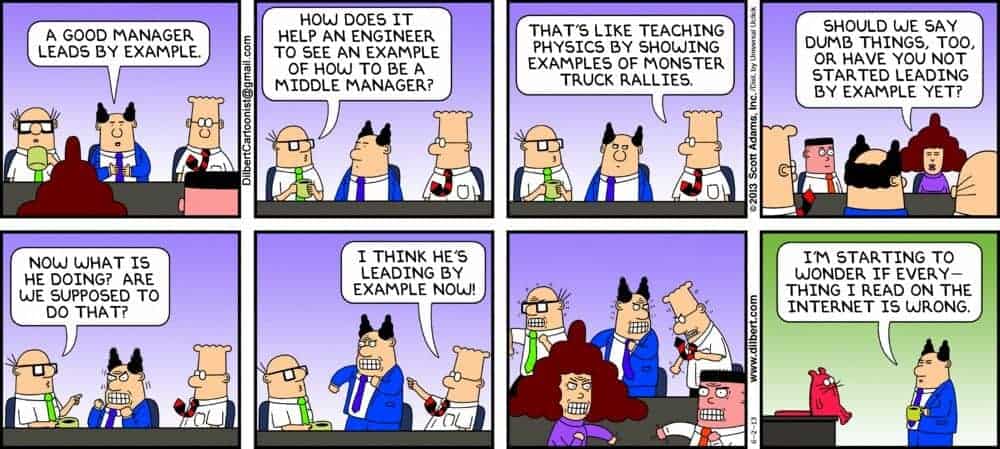
It's hard to build up self-awareness, but it's essential to be a good manager. If you're trying to help a CEO, look for these signals:
- Word choice: Do they say "We" or "I" did something? Is it "our" or "my" accomplishment?
- Responsibility: Do they take responsibility for problems, or is it always someone else's fault?
- Hypocrisy: Have they done everything they ask their team to do, or are they headed down the path of "do as I say, not as I do"?
- Approachable: Are they open to feedback? Do they tend to reward, or shoot, the messenger delivering bad news or problems?
- Character: When someone leaves, is it good riddance, or do they treat past employees with respect?
Little things add up. While many of these can seem subtle on their own, they either add to the health of a company's culture or its slow poisoning.
Over time, working on the example a leader is setting is the best way to fix any problem they're facing and change their culture for the better.
Questions to ask a CEO (or yourself) about leadership:
- Have you noticed how your habits are picked up by your team?
- How did you handle the departure of (person who left)? What do you say about them around the team now if they come up?
- What did you say and do the last time someone brought you bad news?
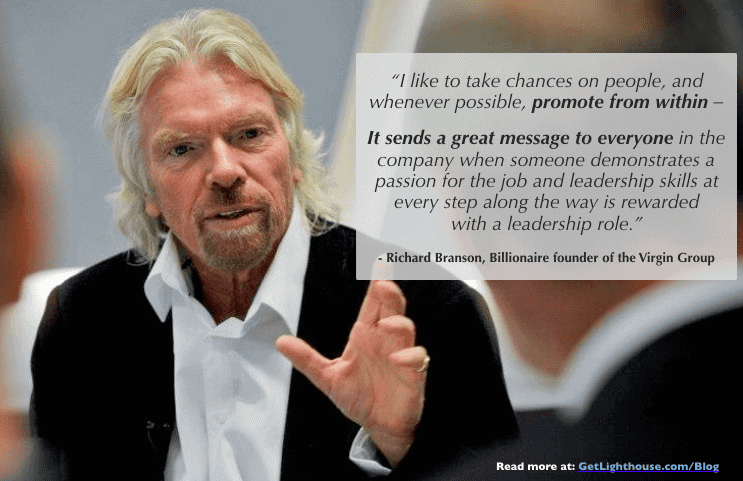
6. Do you promote from within?
Tapping into an employee's goals and core drivers is the great way to praise your team.
The desire for growth and career development is universal across ages, as a Towers Watson study found:
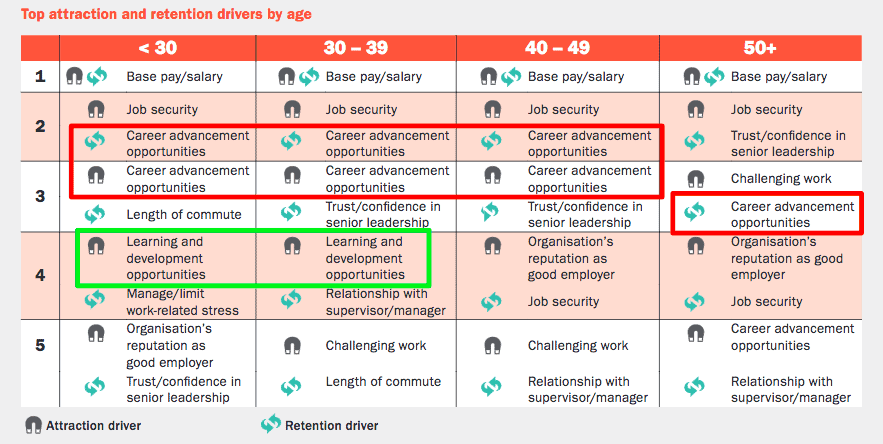
The better a company supports its employee's growth and development, the more those employees are then willing to invest their own time to move the company forward.
According to a study by The Alliance (P. 44), "75% of employees say that they're willing to use their own time to further their careers and take on additional learning that would benefit them at work.”
As a leader, this means that not only can you retain talent longer, but you'll get greater effort by your employees when you help them grow.
Promoting from within vs. Hiring outside talent
One of the most important choices a CEO can make throughout a company's growth is whether to promote from within or hire outside talent for each role. While outside talent is required at times, promoting from within allows you to provide more and larger opportunities for career growth and advancement. This leads to many benefits for the company.

According to a study by Wharton management professor Matthew Bidwell, "external hires” tend to be the all-around worst for a company:
- External hires typically get, "significantly lower performance evaluations for their first two years on the job than do internal workers who are promoted into similar jobs.”
- And the external hires have, "higher exit rates, and they are paid about 18% to 20% more”
This means your external hire costs you more money, is less likely to stick around, and is more likely to underperform. A CEO that tends to hire externally is bound to have a number of those underperformers in senior roles.
However, above it all, the biggest impact promoting from within has is on morale and retention.
This is because one of the biggest reasons for turnovers of people who are otherwise happy to leave their job is a lack of growth. If you're interviewing now, keep in mind you'll be much more likely to stay if you know the company invests in your growth, regardless of how exciting the role you're interviewing for is to you.
And for the investors reading, recognize it's helpful to know the founder's philosophy on growth because it changes their cost structure.
Uncovering diamonds in the rough from within and growing them to be stars can save the company a lot of money, and build deep loyalty. Meanwhile, hiring in senior talent, which so many investors like to advocate for, can do a lot more harm than good as the Wharton study shows us.
Questions to ask a CEO (or yourself) about promotion:
- How much do you look to promote from within vs. hiring in senior leaders?
- Do you and your leaders invest in the growth of your team? In what ways?
- How often do you expect managers in your company to talk to their team members about their careers?
- How do promotion decisions get made here?
Want to encourage your portfolio companies to promote from within or want to learn to apply it in your company? Learn more here:
- Why You Should Promote from Within at Your Company
- The Top 10 Reasons Companies Fail at Promoting from Within
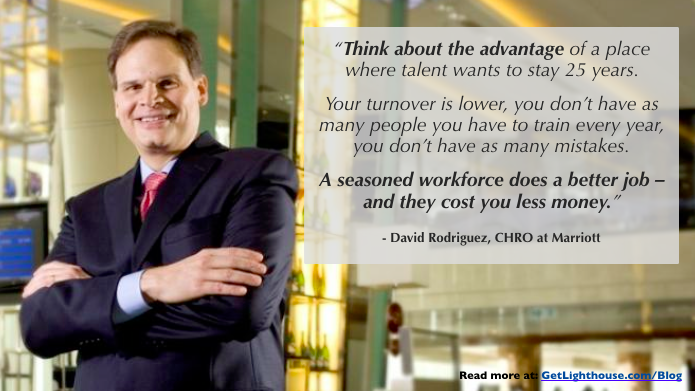
7. What are your views on work-life balance?
Workplace stress and burnout continue to be an issue for employees across the United States. The compound effect of the economic situation, political instability, and being overworked leads to stress and anxiety for many.
In fact, according to Gallup, 44% of employees experienced a lot of daily stress in the previous day in 2022. This is a marked increase from 38% of employees feeling that way pre-pandemic in 2019.
That’s why it’s important to understand a CEO’s view on how to handle this; an unrelenting dictator would be difficult to work for and have high turnover, while a too easygoing leader could end up like Twitter under Parag Agrawal, where people were claiming to work only a few hours a week.
As educator, author, and businessman Stephen Covey puts it:
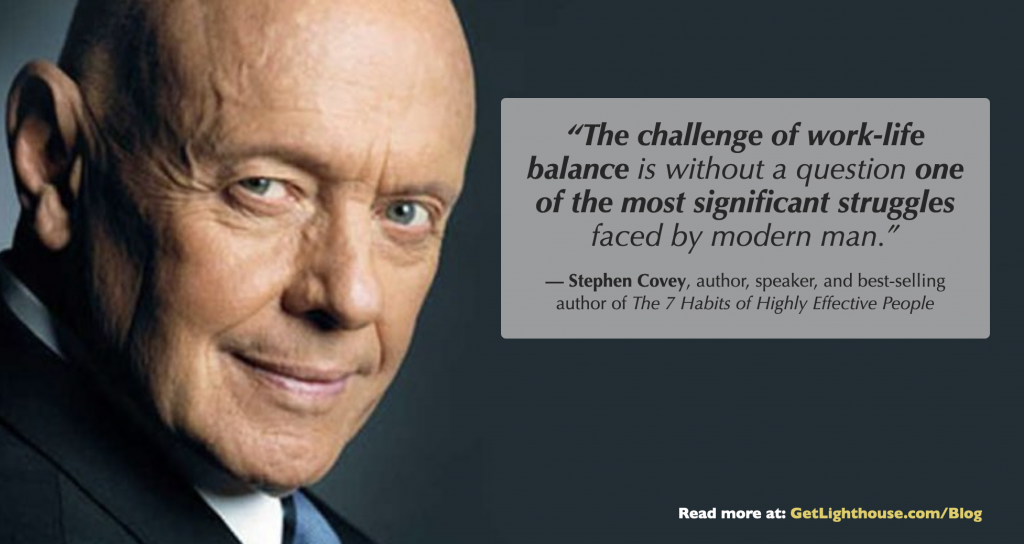
Working in a healthy and supportive environment is an important factor not only for choosing a new job, but also for staying in your current company. This is why discussing issues of burnout, anxiety, work stress, and work-life balance in general is crucial for both attracting new employees and reducing turnover.
Additionally, it's important to recognize there can be a big disconnect between what executives perceive and the reality for employees at your company.
This was made quite apparent in a recent Gallup study that showed that while 65% of Chief Human Resource Officers (CHROs) strongly felt their organization cared about employee well-being, only 24% of employees agreed with that sentiment.
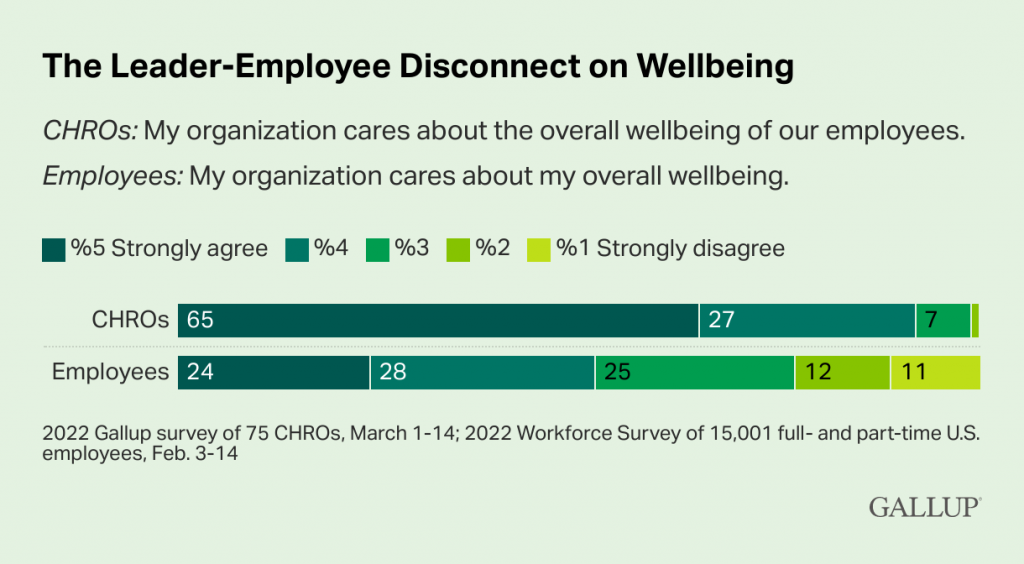
If CHROs are out of touch with how employees are feeling, it’s reasonable to ask if your CEO has a clear perspective as well.
A CEO who has a nuanced take on the importance of work-life balance, and of making sure critical company goals are achieved is a great sign. Their answer can also help you see if the way they look at the balance is something that resonates with you, or you’re best to avoid it.
Questions to ask a CEO (or yourself) about work-life balance:
- How do you avoid burnout of key team members?
- What practices do you follow to maintain your own mental and physical health? (i.e. - what example are they setting?)
- What does the company do to help its employees maintain work-life balance and embrace the marathon that is hard work?
Further reading
Is burnout and managing stress for you and your team on your mind? These posts can help you take the next step:
- Try these 8 Tips to reduce workplace stress that you can share with your coworkers, team, and CEO.
- Another 4 Tips on How to Deal With Anxiety at Work in the Long-Term that you can share
- How to fix employee burnout (written during the peak of the COVID health crisis, but still very much applicable today, especially for those still working remotely!)
And learn about the negative effects of burnout and how to deal with it in this episode of the Creating High Performing Teams podcast:

What questions will a CEO ask in an interview?
If you're interviewing for a new position and you're trying to impress (and the questions we've discussed will help to that end), you might also be wondering what kind of questions the CEO could ask you in an interview.
First, expect they'll ask about your interest in the company. It's often their baby they started, or something they live and breathe 24/7. Be ready to answer questions like, "Why do you want to work here?” and "What are you looking for in your next role?”
If you're an important hire, the CEO may also be involved in the closing process. Once you've passed their filter for why you want to be there and if you'd fit their culture, they'll be asking you questions to find out how they can get you to join their company over others.
Prepare accordingly, and you're more likely to not only get the job, but get an offer that matches what's most important to you.
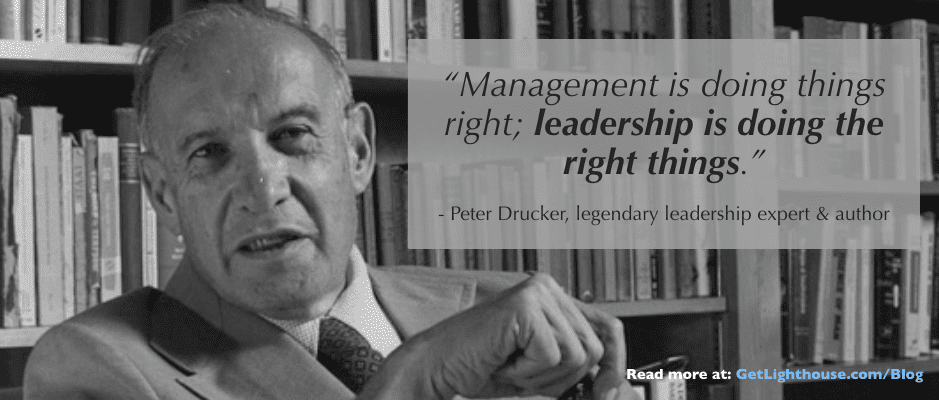
Learn these impactful questions to ask a CEO before it’s too late
A CEO I met once remarked, "every company is a mess"; unfortunately, they saw that as the end of the conversation instead of the start of one on how to get better. That mindset led to them losing wave after wave of staff until their own departure after they had turned over almost the entire staff.
No company is perfect. Even the best company with a great culture will still have some work to do in some of the above areas.
The point of all of this is to make sure leaders are thinking about these things and doing something about it. Making positive progress in these areas is meaningful to their employees and the health of their company's culture.
If you're a CEO growing your company, get out in front of this. Start asking yourself these tough questions and get help making some of these needed habits a reality.
If you're an investor, advisor, friend, or mentor, help the leaders you're working with by being proactive about these questions. Don't wait for them to come to you. Get them thinking about it so they catch the issue sooner. Even if they don't buy in now, they will down the line when things get worse.

What questions should I ask a CEO during an interview?

If you're trying to make a good first impression, asking the right questions during your interview can help. The right questions can also help you gain insights into the company that will help you decide if it's somewhere you'd like to work.
Here are a few examples of good questions to ask a CEO during an interview:
- How much voluntary turnover did you have in the last year?
- How are problems in the company surfaced to you and other leaders?
- Do you and your leaders invest in the growth of your team? In what ways?
- Do managers have 1 on 1s with their team members? How often?
- How much do you look to promote from within vs. hiring in senior leaders?
